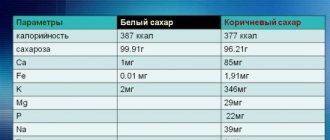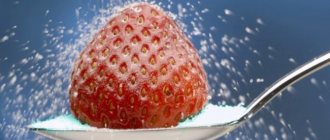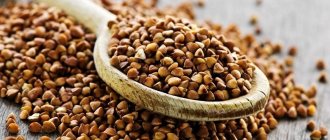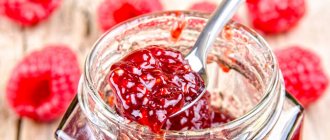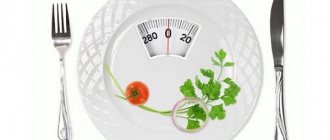How much sugar can you eat a day without harm?
Before answering the question of how many calories are in one teaspoon of sugar, let's try to figure out what sugar is and what its value is for the human body.
Figuratively speaking, sugar, saturated with active carbohydrates, is a kind of fuel for us, allowing us to restore and accumulate energy. It is thanks to sugar that the human body receives substances that generate the necessary energy for normal functioning.
At the same time, it is known that sugar is often, and not unreasonably, called “sweet death.” The fact is that in addition to the necessary substances, so-called “empty” calories enter the human body along with sugar, the excess of which leads not only to obesity, but also to the occurrence of various diseases.
It's no secret that many simply cannot imagine their daily life without all kinds of sweets. Chocolate, cakes, sweets, ice cream, buns - all these melt-in-your-mouth treats not only lift your spirits, but also effectively satisfy your hunger.
However, it should be borne in mind that regularly including sweets in the diet leads to the formation of sugar addiction, which is quite difficult to get rid of.
What is the calorie content of refined sugar and cane sugar?
What is the calorie content of refined sugar and cane sugar?
Some people with a sweet tooth go to all sorts of tricks trying to justify their addiction to sugar. So, they include refined or brown sugar in their diet instead of the usual sand, sincerely believing that the calorie content of these products is lower.
Regarding lump sugar, we note that its calorie content is no different from regular sugar and depends on the size of the cube. 100 grams of sugar contains 398 kilocalories, regardless of its form, and the calorie content of one cube of refined sugar, if necessary, can be calculated by weighing it on a pharmacy scale.
According to doctors, 100 grams of cane sugar contains 377 kilocalories, which is almost identical to the indicators of the product obtained from beets. In addition, brown sugar contains third-party sweeteners that are unlikely to benefit the body.
Are sweeteners harmless?
Are sweeteners harmless?
In an attempt to combine business with pleasure, some people with a sweet tooth, giving up sugar, switch to consuming various sugar substitutes. Today there are several types of synthetic products on the market that can replace sugar to one degree or another - these are:
- saccharin,
- aspartame,
- sodium cyclamate,
- acesulfame potassium,
- sucralose.
Just by the name of some of these products, it becomes obvious that they come to our table from a “test tube”, and this cannot but alarm people who are serious about their health. Despite the fact that all of the above substitutes do not contain calories, their usefulness is highly questionable.
Studies have found that saccharin, aspartame and cyclomine contain carcinogens and contribute to the development of gallstones, allergies and other diseases. Acesulfame potassium is safer, but due to its heat stability it has not gained popularity among consumers.
Sucralose is considered the best sweetener today; no side effects have been identified from its consumption.
Summarizing the above, it should be noted that sugar is, of course, the most important product necessary for the human body.
However, its excessive consumption can lead to dire consequences:
- obesity,
- caries,
- increased blood sugar levels and other health problems.
To prevent a sweet product that generates happiness hormones from turning into a sweet poison, you just need to know and strictly follow the norms for its consumption.
Benefits and harms, daily intake
To lead a healthy lifestyle, you must follow the daily norm of granulated sugar. Men are allowed to eat no more than 9 teaspoons of the product per day, women - only 6, since they have a slow metabolism and are more prone to obesity. This does not mean that the product is consumed in its pure form, added to tea and other drinks and dishes. In this case, the component is also taken into account when included in other products - these are not only sweets, but also juices, fruits, vegetables, and flour products.
The benefit of granulated sugar is to activate the functioning of internal organs, as well as the release of the hormone of joy and happiness. Despite the beneficial properties presented, granulated sugar is an empty carbohydrate that does not satiate, but increases the total daily calorie intake.
Important: Excessive consumption leads to the development of caries, accumulation of fat cells, and removal of minerals and calcium from the body.
The questions of how many kcal are in granulated sugar, how beneficial and harmful the product is to the human body are discussed in detail. You should not pay attention to caloric content. It is enough to give up sweets and starchy foods - to exclude empty and easily digestible carbohydrates, which, if consumed excessively, are converted into fats and do not saturate the body for a long time.
What is refined sugar?
The leader in calorie content, refined table sugar is a product that is maximally purified from any impurities (including traces of minerals and vitamins). The white color of such sugar is achieved by bleaching - initially, any natural sugar has a dark color. The texture of granulated sugar is also obtained artificially.
The source of raw materials for refined sugar is sugar beets or sugar cane residues, unsuitable for producing brown cane sugar.
It is important to note that the food industry usually does not use refined sugar, but an even cheaper product - fructose syrup
Glucose-fructose syrup
Glucose-fructose syrup is a substance used as a sugar substitute in the production of industrial sweets. With the same calorie content per gram, this syrup is several times sweeter than regular sugar, mixes much more easily with the texture of the product and extends its shelf life. The raw material is corn.
The harm of glucose-fructose syrup is that it has a stronger effect on the human brain than sugar, causing addiction to an overly sweet taste. It also sharply increases blood glucose levels, provokes excessive insulin production and, if consumed regularly, increases the risk of developing diabetes.
Are sweeteners harmful?
Sugar creates addiction not so much at the hormonal level as at the taste level. Essentially, a person gets used to eating sweet sugar and is constantly looking for this taste. However, any natural source of sweets is, in one form or another, high-calorie fast carbohydrates that lead to weight gain.
Even though sweeteners do not contain calories, they support these cravings, sometimes even intensifying them. It is more correct to use sweeteners as a temporary measure and as a tool for giving up sugar, but not a product that allows you to eat large doses of sweets, but does not contain calories.
// Read more:
- fast carbohydrates - food list
- how to remove belly fat?
- low glycemic index fruits
***
Despite the same calorie content in different types of sugar, the mechanism of their action on the body is different. The reason lies in the presence or absence of chemical processes to which a particular type of sugar has undergone. In most cases, natural sugar is healthier than synthetic sugar, even with the same calorie content.
Material rating:
Sugar - calories and glycemic index. Which sugar is the healthiest?
4.28 / 29
You need to enable JavaScript to vote
About calories per spoon of cane variety
The nutritional value of cane sugar is slightly less than standard white sugar, so the following calorie indicators are distinguished here:
- a tablespoon contains only 20 g and 75 calories;
- a teaspoon - this is from 20 to 30 kcal of cane sugar;
- the reduced amount of calories lies in the composition - there are more minerals, so it is better to give preference to the cane variety rather than the white one.
You should not use cane sugar in excessive quantities, thinking about possible weight loss.
Is it possible to drink coffee while dieting?
Coffee connoisseurs who decide to go on a diet in order to lose weight should remember some restrictions:
- There are diets in which drinking it is prohibited. For example, in diet No. 5 developed by doctors.
- It is prohibited for people suffering from pressure changes, hypertension, as well as high acidity, pancreatitis, during exacerbation of ulcers or gastritis.
- If you have chosen a mono-diet that includes the consumption of fresh vegetables or fruits, it is better to refuse or limit its consumption to a minimum during this period, since acid (for example, malic acid) irritates the gastric mucosa. And coffee enhances this effect, as a result of which you may feel a sharp pain in the stomach. Since it also contains malic, pyruvic, quinic and chlorogenic acids.
- If your health condition and chosen diet allow you to consume coffee, drink brewed or instant coffee without additives. It is recommended to choose the “classics”: “Americano”, “espresso” or “ristretto”.
So, for example, nothing can compare with fruits in terms of usefulness. They help flush out toxins from the body, as well as food debris, which over time turns into waste. They are a quality assistant in the fight against excess weight, give a person energy, and help improve the functioning of the stomach. We get vitamins, minerals, fats, amino acids and glucose in their natural form from fruits.
Many of us add sugar to our tea and coffee. And by adding one teaspoon of sugar to the drink, you will increase its energy value by about 16 kcal.
Its energy value is approximately 377 kilocalories per 100 grams or 11 kcal per teaspoon.
Some nutritionists believe that unrefined brown sugar may contain unwanted contaminants and is unlikely to be healthier than regular white sugar.
Composition of honey
Honey practically consists of sugars (77%). It includes:
- glucose;
- sucrose;
- maltose;
- levulosis;
- water;
- mineral salts.
Honey is a real storehouse of energy. It is useful for athletes, sick people and those who perform difficult physical work. For people on this list, even 100 grams of honey will not harm, but the rest need to limit themselves in consuming the product. Otherwise, you can quickly gain excess weight.
Are sweeteners harmful?
Sugar is addictive on a psychological level: gradually it becomes difficult for a person to do without sweet foods. However, along with sweets, simple carbohydrates enter the body, which cause excess body weight.
Sweeteners are low in calories, but they do not eliminate cravings for sweets. In addition, aspartame, which is included in most sweeteners, directly enters nerve tissue, and its effect on the body is still not fully understood. Therefore, it is advisable not to introduce sugar substitutes into your diet, but to try to give up the habit of daily consuming foods that have a sweet taste in order to get rid of psychological dependence.
Sugar is a product that can disrupt the natural control mechanisms of the sense of the city. The result of this is overeating: you want more and more sweet foods. Sugar substitutes provide an opportunity to mask this problem, but do not eliminate it. Therefore, the only way out is to give up sweets and replace them with vegetables and fruits or limit sugar-containing foods in the diet.
Why is sugar deadly? – Everything will be fine – Issue 651 – 08/12/15
Watch this video on YouTube
Contraindications
Honey has a number of contraindications for consumption. Since the product is an allergenic product, it may be dangerous for people with such a predisposition. An allergy can be caused by a certain variety or component included in the composition. Before use, you should conduct a small test if you are not sure if you are allergic to bee products.
Propolis is a healthy substitute for sugar, but just as high in calories. Ingesting it in large doses can lead to obesity and increased blood sugar levels. Those who are on a diet need to know this.
- Calorie content of coffee without sugar
When heated above 45 °C, honey loses some of its beneficial properties, and at 50 °C it becomes completely toxic and dangerous to the body.
Calorie content, amount of carbohydrates
Excessive consumption of sweets is harmful to a person, and if you have diabetes, their amount must be minimized
It is very important to limit the consumption of sugary foods for people who have problems with excess weight. Therefore, they need to strictly control the amount of this product and take into account the calories in a spoonful of sugar
The calorie content of 100 grams of the product is 398 kilocalories. Therefore, we can calculate that with a level teaspoon we get 20 kilocalories, and with a tablespoon – 80 kilocalories. You should always remember these numbers when adding another spoon to a cup of coffee or tea. The cane version has almost the same calorie content, although doctors claim that it is healthier than the beet version.
Sugar is a simple carbohydrate. Therefore, when asked how many carbohydrates are in a spoonful of sugar, you can get the following answer - the same amount as the product itself. One hundred grams of sand is equivalent to 100 grams of fast carbohydrates. Eating sweets increases the likelihood of tooth decay and excess weight in adults and children. It is necessary to strictly control the amount of sweets consumed, especially carbonated drinks.
Therefore, it is so important to follow the recipe, measure the exact amount of ingredients, trying to reduce the calorie content of food by reducing the consumption of sweet ingredients
https://youtube.com/watch?v=uZ0KkxY9ORo%3F
Benefit
What are the calorie content and beneficial properties of granulated sugar? First, let's answer the question about calorie content. 100 grams of product contains 398 kcal. What are the benefits of sugar, if any?
Yes, and quite a lot. Let's start with the fact that sugar contains glucose, which is necessary for the normal functioning of the body. It even stores glycogen in the liver, which it supplies to the brain when we sleep.
Without sugar entering the body, the pancreas stops producing insulin. This is fraught with consequences.
There is a so-called “happiness hormone” - serotonin. And its release depends on the level of glucose in the body. Glucose stops flowing - serotonin is not released. This means that depression and irritability will become faithful companions of a person who does not consume sugar at all.
It has been proven that a piece of refined sugar is enough to lift your mood. It is no coincidence that they recommend eating something sweet when depression and despondency are knocking on the door.
Daily sugar intake for humans
Large sums of money have been spent to convince us that sugar is necessary in your diet.
Manufacturers said that weight problems are not due to excessive sugar consumption, but due to low activity.
This disinformation was initially funded by millions of dollars from Coca-Cola.
Sugar benefits and harms for the body
Few people know about the benefits of sugar. We know that it adds flavor to foods, especially sweets.
It also provides quick energy for physical work or training.
But sugar does more harm than good.
Research shows when people eat modern processed foods high in sugar and refined flour, they get sick
Scientists reviewed 8,000 independent clinical scientific articles about sugar and its role in metabolic processes.
Sugar related diseases
They found that sugar is one of the leading killers of people and causes diseases:
- hearts,
- type 2 diabetes
- liver disease
- caries
One fifth of 10- to 11-year-olds are obese, and nearly two-thirds of adults are overweight or obese, with sugary drinks being one of the leading causes.
Sugary drinks should be eliminated from a child's diet, but they account for almost a third of their daily sugar intake.
Soft drinks contain caffeine, a mild diuretic that causes you to urinate more, thereby eliminating water from your body.
Drinks also contain salt, which makes you thirsty.
For this reason, sweet drinks contain so much sugar to mask the taste of salt.
Do beverage companies know what they are doing?
They do this so that you buy more, and they do everything so that you will buy more.
This is their business strategy.
Unfortunately, this strategy is slowly killing customers.
Too much sugar in the diet doesn't just make us fat. We've all been raised to think that sugar has benign "empty calories."
But science shows that consuming too much sugar leads to high blood pressure, fatty liver and insulin resistance.
Knowing this, the next time you reach for a sugary drink, grab a glass of ice water instead.
Name of sugar
Other names for sugar
Different names for added sugar
Many people are simply unaware of how much sugar they consume.
Sugar goes by many different names, depending on its source of production.
Therefore, it is difficult to detect added sugar even when you read the ingredients on the label.
Here is a list of more common names for sugar:
- sucrose
- glucose
- fructose
- dextrose
- galactose
- maltose
- fruit juice
- molasses
- hydrolyzed starch
- corn syrup
- honey
Use of sugar
In addition to providing sweet taste and aroma, sugar serves various functions in foods.
Sugar is used as a preservative, where sugar inhibits the growth of microorganisms.
Sugar is an important element in the baking process like cakes; it retains moisture and prevents it from drying out (stale).
In canned fruits and vegetables, sugar enhances texture and color.
Sugar is used to prevent the formation of large ice crystals in frozen sweet mixtures, such as ice cream.
It supports fermentation in foods containing yeast, such as bread.
In these roles and others, sugar is an important and versatile component of food.
Refined sugar
When we talk about sugar, we mean honey, sugar, high fructose corn syrup, and naturally occurring fructose found in fresh juices and whole fruits.
GOST for honey products
GOST R 54644 2011 for the latest bee delicacy “Natural honey. Technical conditions" has been in effect since January 1, 2013, but most organizations, when labeling goods, put GOST 19792-2001. There is no error here - GOST 19792-2001 is valid until 01/01/2017.
According to GOST R 54644-2011, they are divided into:
- honeydew - collected by insects from deciduous or coniferous plantings;
- floral - collected by insects from honey-bearing flowers;
- mixed - a natural combination of these two types.
According to the method of collection, the product is classified into:
- pressed - produced by pressing honeycombs;
- centrifuged - extracted from honeycombs using centrifugation;
- honey in combs - a piece or several pieces of honeycomb placed in a container and poured into a centrifugal honey delicacy.
Only the above types of honey products with the following data are allowed for sale:
- must be liquid, fully or partially candied;
- without third-party aromas, with its own pleasant odors;
- be sweet, without unnecessary aftertaste.
Honey poured into jars and ready for sale or storage
How many calories are in a spoonful of sugar and a piece of refined sugar?
Many people cannot imagine their existence without sugar. After all, various sweets such as candies, pastries, chocolate and cakes can not only satisfy the feeling of hunger, but also lift your spirits.
Sugar consists of active carbohydrates, which in turn play an important role in the process of saturating the body with various nutrients and releasing the energy necessary for all vital processes. In addition, sucrose is capable of breaking down easily digestible glucose in a fairly short period of time.
At the same time, the caloric content of sugar scares those who carefully monitor their weight or are trying to get rid of a few extra pounds. That is why many are interested in the question, how many calories are in a spoonful of sugar?
- Calorie content of a spoon of sugar
- Sugar substitutes
Calorie content of a spoon of sugar
Many suffer from a real addiction to sugar, in which case a day without consuming it passes gloomily and dullly. After all, various foods containing sugar bring pleasure and lift your spirits.
It is worth noting that the calorie content of this product is quite high, for example, the calorie content of sugar in a teaspoon is on average 20 kilocalories.
At first glance, this value may not seem high, but it is worth remembering how many spoons of sugar you consume throughout the day.
In some cases, the calorie content of sweets eaten per day can be equal to a full meal, which is about 400 kilocalories.
In addition, according to doctors, sugar and products containing it have an adverse effect on various organ systems. For example, sweets have a negative effect on tooth enamel, resulting in the development of caries.
Despite this, there are benefits from consuming sugar, as it provides the body with energy and improves brain performance and mood.
In addition to the fact that glucose has a supporting effect on the liver, it also takes an active part in the body's fight against toxins. It is for this reason that in case of some diseases or poisonings, additional glucose is administered in the form of an injection.
The calorie content of 1 spoon of sugar, as mentioned above, is 20 kilocalories, respectively, if you drink sweetened tea daily, this number can increase to 150 kilocalories per day.
At the same time, we should not forget about buns, cakes, candies and other sweets that we are used to eating at least once a day; they will increase this indicator several times more.
That is why, knowing how many calories are in a spoonful of sugar, think carefully before sweetening your tea, coffee, cocoa or any other drink again.
It is worth noting that the calorie content of a spoonful of sugar is much higher than that of one piece of refined sugar; this value is equal to 10 kilocalories.
When fighting extra pounds, you need to know that the daily intake of carbohydrates is 130 grams, which is exactly the amount that is enough for energy consumption.
Based on this, women are allowed to consume no more than 25 grams of sugar (6 teaspoons) daily. For men, this figure is slightly higher (9 teaspoons of sugar) because they expend more energy throughout the day.
Sugar substitutes
Even though sugar is the main source of glucose, in some cases it can significantly raise blood levels.
In addition, the pancreas often suffers from eating sweets (from large amounts of sucrose), as a result of which the process of producing insulin necessary for normal functioning slows down.
In this case, experts categorically prohibit eating sweet foods.
The number of calories in a teaspoon of sugar can be dangerous for the body, but substitutes contain no sugar at all. Undoubtedly, the body will react to the absence of a favorite product quite quickly, since the taste buds at first will not perceive substitutes for the usual sugar.
That is why it is recommended to wean yourself off this product gradually, despite the fact that initially it will be unpleasant or even painful, over time the taste buds will no longer sense the absence of sugar.
Nutrient content
Being not only sweet, but also a healthy product, unlike sugar, honey contains many vitamins and minerals and therefore has healing properties.
Regular consumption helps strengthen the skeletal system and cleanse the blood. Honey contains vitamins B1, B2, B3, B4, B5, B6, and a lot of folic acid. Along with antioxidants, they remove toxins from the body and thereby reduce the risk of cancer.
It contains vitamin C, so it is used to prevent colds.
- How many drops in 1 ml - how many drops in a teaspoon and a tablespoon
Nicotinic acid reduces blood cholesterol levels and cleanses blood vessels. Thanks to honey and the bifidobacteria and lactobacilli it contains, the intestinal microflora is normalized and digestion is improved.
The antiseptic and bactericidal effect is due to the presence of phytoncides in it.
Potassium and magnesium prevent the development of anemia and strengthen the heart muscle. Glucose and fructose, saturating the body and feeding it with energy, are a healthy alternative to sugar.
Brown sugar calories
In recent years, there has been a lot of talk about brown cane sugar and its great benefits. Some even completely replace the standard white variety with the brown one, as they are confident that its energy value is much lower than that of the usual one. Indeed, the calorie content of this product will differ from that of the white species. But 100 grams contains 378 calories, and the difference actually turns out to be insignificant. Therefore, if you replace one variety with another, there will be no significant difference in weight loss due to the same number of calories.
Up until the 18th century, sugar was considered a luxury. In Tsarist Russia they paid 15 kopecks for a spoonful of sugar, while chicken cost 5 kopecks and a piece of beef 3 kopecks. The product became available to all segments of the population only after people learned to produce it from sugar beets, which Napoleon Bonaparte contributed greatly to.
Now white carbohydrate is widespread all over the world; according to statistics, a person eats an average of 60 kg of sugar per year. Nutritionists all over the planet insist on abandoning what they believe is a harmful product, citing the high calorie content of sugar and its uselessness.
There are several types of sugar: beet, cane, maple and palm. Depending on cleaning methods, it may appear white or yellow. The calorie content of each type of sugar is almost identical, differing only in a few calories. In the vast expanses of the CIS, the beet species dominates.
In 100 g of sugar, the calorie content reaches 399 kcal. 99% of the product consists of mono and disaccharides; it is these substances that give sugar its calorie content. A small fraction - only one percent - consists of calcium, iron, water, sodium.
Maple sugar has a slightly different calorie count at 354 calories. The main supplier of the product is Canada. The raw materials for production are maple buds.
White carbohydrate is actively used in canning, cooking, and even in preparing second courses. In recipes for desserts and baked goods, the amount of sugar is usually measured in glasses or spoons. Therefore, it would be useful to know how many calories are in a spoon.
A full-size tablespoon holds 20 g of sugar, if you pour the product heaped - 25 g. Considering that 1 g is 3.99 kcal, it is easy to calculate how many calories are contained in one spoon.
Lovers of sweet tea or coffee sometimes do not take into account how many calories are in a teaspoon, and as a result, sugar consumption exceeds the permissible limits, which leads to the appearance of unwanted extra pounds.
A classic teaspoon can hold from 5 to 7 g of bulk product. Using data on the weight and calorie content of 1 g, using simple arithmetic operations you can calculate how many calories are in a spoon.
One teaspoon contains from 20 to 35 kcal.
About calories per spoon of cane variety
The nutritional value of cane sugar is slightly less than standard white sugar, so the following calorie indicators are distinguished here:
- a tablespoon contains only 20 g and 75 calories;
- a teaspoon - this is from 20 to 30 kcal of cane sugar;
- the reduced amount of calories lies in the composition - there are more minerals, so it is better to give preference to the cane variety rather than the white one.
You should not use cane sugar in excessive quantities, thinking about possible weight loss.
Proteins, g
From the above it follows that it is recommended to reduce consumption of the product - this is also justified by the composition.
Appearing as:
- about 99% of the total amount in the composition is given to mono- and disaccharides, which give the calorie content to sugar and sweetener;
- the remainder is given to calcium, iron, water and sodium;
- Maple sugar has a slightly different composition, which is why its calorie content does not exceed 354 kcal.
It is better to purchase maple sugar only from producers from Canada, since this country can ensure the quality of the product.
What harm does glucose syrup cause?
Glucose-fructose syrup is usually used as an inexpensive sweetener in the food industry. This syrup tastes much sweeter than usual sugar, and besides, it is much easier to stir it into foods. Finally, syrup extends the shelf life and storage of products. Corn syrup is made.
Unfortunately, glucose-fructose syrup has one significant drawback. It stimulates addiction to the sweet taste, as a result of which a person is forced to consume more and more glucose, which negatively affects body weight. In addition, the syrup provokes excessive production of insulin, which becomes a prerequisite for the development of such a dangerous disease as diabetes.
The benefits of honey
Honey has been eaten for many centuries, and all this time people have used its medicinal properties. Three thousand years ago, the ancient Greeks already treated colds and stomach problems with honey. Honey as a medicine is popular to this day.
Here are some more benefits of honey:
- Honey consists of enzymes that are simply necessary for the human body. These microelements include magnesium, potassium, phosphorus, iron and iodine. Honey also contains vitamins B2 and B6, folic acid and pantothenic acid.
- Honey has a bactericidal effect. Bees produce a substance that helps fight bacteria.
- Honey never molds, it only becomes sugared. Any fungus that gets into honey dies immediately.
But you shouldn’t stock up on honey for future use, even if you want to use it for medicinal purposes. Honey can only be stored for one year. After a year of storage in honey, the level of vitamins decreases significantly, the antimicrobial effects disappear, and only sucrose remains, which can only harm the figure.
How many calories are in a spoonful of sugar and a piece of refined sugar?
Many people cannot imagine their existence without sugar. After all, various sweets such as candies, pastries, chocolate and cakes can not only satisfy the feeling of hunger, but also lift your spirits.
Sugar consists of active carbohydrates, which in turn play an important role in the process of saturating the body with various nutrients and releasing the energy necessary for all vital processes. In addition, sucrose is capable of breaking down easily digestible glucose in a fairly short period of time.
At the same time, the caloric content of sugar scares those who carefully monitor their weight or are trying to get rid of a few extra pounds. That is why many are interested in the question, how many calories are in a spoonful of sugar?
- Calorie content of a spoon of sugar
- Sugar substitutes
Calorie content of a spoon of sugar
Many suffer from a real addiction to sugar, in which case a day without consuming it passes gloomily and dullly. After all, various foods containing sugar bring pleasure and lift your spirits.
It is worth noting that the calorie content of this product is quite high, for example, the calorie content of sugar in a teaspoon is on average 20 kilocalories.
At first glance, this value may not seem high, but it is worth remembering how many spoons of sugar you consume throughout the day.
In some cases, the calorie content of sweets eaten per day can be equal to a full meal, which is about 400 kilocalories.
Despite this, there are benefits from consuming sugar, as it provides the body with energy and improves brain performance and mood.
In addition to the fact that glucose has a supporting effect on the liver, it also takes an active part in the body's fight against toxins. It is for this reason that in case of some diseases or poisonings, additional glucose is administered in the form of an injection.
Undoubtedly, nutritionists recommend reducing the amount of sugar and sugar-containing products consumed daily. This is explained by the fact that the calorie content of 1 spoon of sugar is quite high, and increased consumption of foods containing it can cause obesity due to the accumulation of “empty” calories in the body.
The calorie content of 1 spoon of sugar, as mentioned above, is 20 kilocalories, respectively, if you drink sweetened tea daily, this number can increase to 150 kilocalories per day.
At the same time, we should not forget about buns, cakes, candies and other sweets that we are used to eating at least once a day; they will increase this indicator several times more.
That is why, knowing how many calories are in a spoonful of sugar, think carefully before sweetening your tea, coffee, cocoa or any other drink again.
It is worth noting that the calorie content of a spoonful of sugar is much higher than that of one piece of refined sugar; this value is equal to 10 kilocalories.
Based on this, women are allowed to consume no more than 25 grams of sugar (6 teaspoons) daily. For men, this figure is slightly higher (9 teaspoons of sugar) because they expend more energy throughout the day.
Sugar substitutes
Even though sugar is the main source of glucose, in some cases it can significantly raise blood levels.
In addition, the pancreas often suffers from eating sweets (from large amounts of sucrose), as a result of which the process of producing insulin necessary for normal functioning slows down.
In this case, experts categorically prohibit eating sweet foods.
The number of calories in a teaspoon of sugar can be dangerous for the body, but substitutes contain no sugar at all. Undoubtedly, the body will react to the absence of a favorite product quite quickly, since the taste buds at first will not perceive substitutes for the usual sugar.
That is why it is recommended to wean yourself off this product gradually, despite the fact that initially it will be unpleasant or even painful, over time the taste buds will no longer sense the absence of sugar.
Knowing how many calories are in a spoonful of sugar, you must realize that in order to part with extra pounds and reduce waist inches, you need to completely or partially stop consuming it.
Daily sugar intake for women and men
In accordance with WHO standards, the percentage of calories that enter the body with sugar should be no more than 10% of the total. For men, this sweetener norm is up to 9 teaspoons, for women – 6.
But this number needs to take into account more than just the number of teaspoons of sweetener that have been added to drinks or certain dishes. You need to count the amount of sweetener in all food eaten per day. For example, a glass of a sweet carbonated drink with some sweets can pay for the entire daily requirement in one go.
This is interesting! American researchers were able to calculate that the average US resident eats 190 g of sweetener daily. In Russia, the statistics are different, where the number is 100 g of granulated sugar per day per average resident.
Useful properties of cane sugar
The main advantage of consuming this particular type of sugar is its beneficial effect on brain activity. It improves memory and mood, calms, and increases performance. It is useful to eat it to normalize the functioning of the intestines, liver, heart, and kidneys. But all this is relevant only if you do not overdo it with this product. It should be noted that without it, dishes do not have such a pronounced taste. We list here all the beneficial effects of cane sugar:
- Strengthens bones
. The product makes them stronger due to the calcium content in the composition, prevents the development of various joint diseases, prevents fractures and allows for faster recovery from them. Considering all this, it is especially recommended to include it in small quantities in the diet of children, pregnant women and the elderly. - Restores the body's protective functions
. Vitamin C, ash and water together strengthen the immune system, allowing it to successfully repel attacks from viruses and infections, minimizing the risk of developing ARVI, influenza, sore throat, etc. - Gives energy
. Since carbohydrates are the basis of the composition of this type of sugar, it increases efficiency and prevents you from getting tired quickly. With its help, you gain more strength and desire to lead an active lifestyle. - Normalizes the functioning of the nervous system
. Cane sugar improves your mood, gives you a boost of energy, and sets you up for positive thoughts. As a result, the quality of sleep improves, migraines and general weakness go away. - Normalizes blood pressure
. As a result, dizziness and nausea disappear in patients with hypertension, and the pulse is restored. But all this is possible only if the disease is not advanced, at stages 1-2. - Cleanses the body
. This sugar removes all toxins from it, neutralizes the negative effects of free radicals and heavy metal salts, and speeds up metabolism. All this has the best effect on the functioning of the digestive system. - Supports heart function
. In order for it to function without problems, it is necessary to consume foods rich in potassium. This chemical element is precisely contained in cane sugar, so it allows you to normalize the heart rhythm, strengthen the muscles of this organ, and reduce the likelihood of developing various cardiac diseases.
Considering the enormous benefits of cane sugar, it will be indispensable for mental workers, athletes who experience increased stress on their joints and need large amounts of carbohydrates.
Recommendations for selection and use
The best honey is a mature and high-quality product. Those who know beekeepers are certainly lucky. After all, they are the ones who will provide the highest quality and healthiest product all year round. But how to determine a quality product when buying on the market? First of all, you need to choose a place of sale where you can smell the product, try it, and carefully examine it. The easiest way to determine the quality is to drop a small amount on a saucer. High-quality and well-ripened honey will very slowly slide off the spoon, once at the designated point, and will retain its shape for a long time. Poor quality will quickly slide off the spoon and spread across the plate.
How to choose the right product?
https://www.youtube.com/watch?v=ytcopyrightru
When purchasing, it is important to give preference to reputable retail outlets. There are a large number of counterfeits of this unique product on the market.
It can be either a variety produced by bees in a closed apiary with only their sugar, or a completely artificial product.
To choose a quality type of purchase, it is important to consider:
- Liquid honey a couple of months after the honey-bearing period is not natural; such a product without additives necessarily hardens and becomes sugary.
- Honey has a pleasant aroma, although varieties that lack aroma may be offered.
